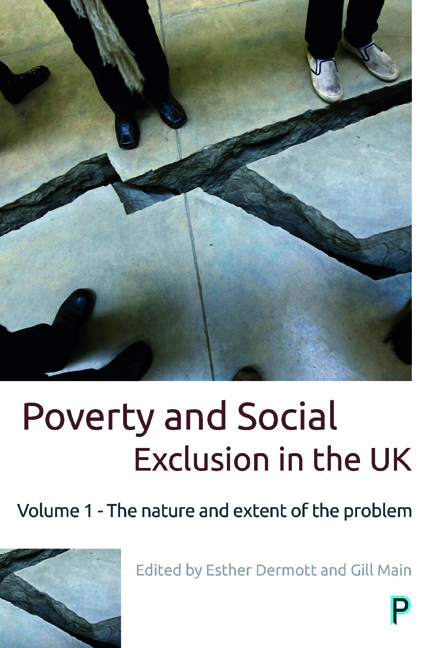Book contents
- Frontmatter
- Dedication
- Contents
- List of tables and figures
- Notes on contributors
- Acknowledgements
- Introduction: poverty and social exclusion in the UK
- One Measuring poverty in the UK
- Two The impoverishment of youth: poverty, deprivation and social exclusion among young adults in the Uk
- Three Improvement for some: poverty and social exclusion among older people and pensioners
- Four Which men and women are poor? Gender, poverty and social exclusion
- Five Better understandings of ethnic variations: ethnicity, poverty and social exclusion
- Six Improving lives? Child poverty and social exclusion
- Seven The cost of children: parents, poverty, and social support
- Eight A worsening picture: poverty and social exclusion and disabled people
- Nine Devolution and North/South division: poverty and social exclusion in the countries and regions of the UK
- Ten More similarities than differences: poverty and social exclusion in rural and urban locations
- Conclusion: innovating methods, informing policy and challenging stigma
- Technical appendix
- Index
Eight - A worsening picture: poverty and social exclusion and disabled people
Published online by Cambridge University Press: 08 April 2022
- Frontmatter
- Dedication
- Contents
- List of tables and figures
- Notes on contributors
- Acknowledgements
- Introduction: poverty and social exclusion in the UK
- One Measuring poverty in the UK
- Two The impoverishment of youth: poverty, deprivation and social exclusion among young adults in the Uk
- Three Improvement for some: poverty and social exclusion among older people and pensioners
- Four Which men and women are poor? Gender, poverty and social exclusion
- Five Better understandings of ethnic variations: ethnicity, poverty and social exclusion
- Six Improving lives? Child poverty and social exclusion
- Seven The cost of children: parents, poverty, and social support
- Eight A worsening picture: poverty and social exclusion and disabled people
- Nine Devolution and North/South division: poverty and social exclusion in the countries and regions of the UK
- Ten More similarities than differences: poverty and social exclusion in rural and urban locations
- Conclusion: innovating methods, informing policy and challenging stigma
- Technical appendix
- Index
Summary
Introduction
There have been mixed messages in recent years about UK policies for and about disabled people. On the one hand, the disability strategy Fulfilling potential: Making it happen for disabled people (Department for Work and Pensions, 2013), updated in 2014, sets out the government's view of a society where disabled people can realise their aspirations and fulfil their potential. On the other hand, campaigns to strengthen and protect disabled people's rights made the headlines when the national budget in 2016 was described as a ‘sugar-coated assault on disabled people’ by The Guardian newspaper ( The Guardian, 2016). A string of reforms over recent years, including a change from Disability Living Allowance to Personal Independence Payments (PIP), changes to Employment Support Allowance, and cuts to social care funding have all left disabled people at increased risk of poverty and social exclusion.
In this chapter we present our analysis of the Poverty and Social Exclusion Survey 2012 (PSE-UK 2012) data in relation to disabled people in the UK. First, we look at how people have defined themselves as disabled, before moving on to exploring their experiences of low income, deprivation and poverty.
The precise extent of poverty and social exclusion among disabled people can, in many ways, be considered a ‘wicked problem’. ‘Wicked problems’ are unique social or cultural problems that are difficult or impossible to define, let alone solve. They do not have simple causes, or solutions, and because of complex interdependencies, the effort to solve one aspect of a wicked problem may reveal or create other problems. The use of term ‘wicked’ is in relation to the problem's resistance to definition, measurement or resolution, rather than in relation to being evil.
So what makes the issue of poverty and disabled people a ‘wicked problem’? First, there is no clear way of defining and therefore counting disabled people. Theoretical, policy and people's own perceptions of who is ‘disabled’ differ. Second, measuring poverty in disabled people is problematic as it frequently does not take account of the additional costs that disabled people incur because they are disabled. Let us first explore these aspects in a little more detail.
- Type
- Chapter
- Information
- Poverty and Social Exclusion in the UK Vol 1The Nature and Extent of the Problem, pp. 173 - 192Publisher: Bristol University PressPrint publication year: 2017
- 1
- Cited by



